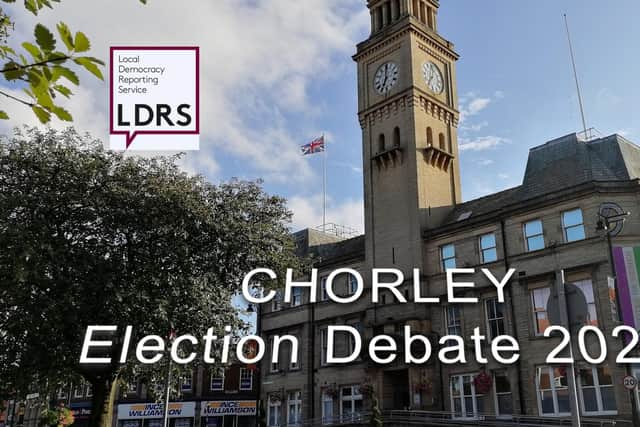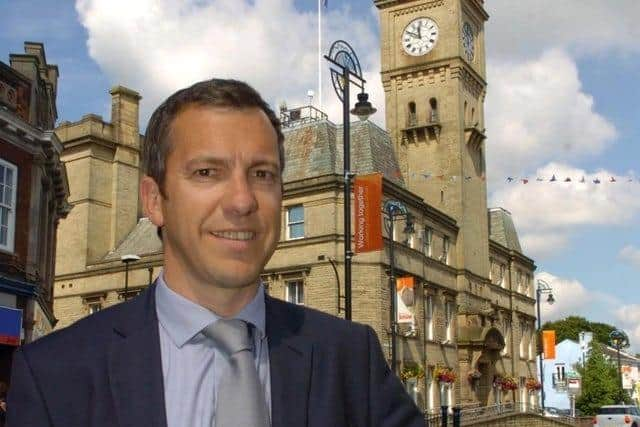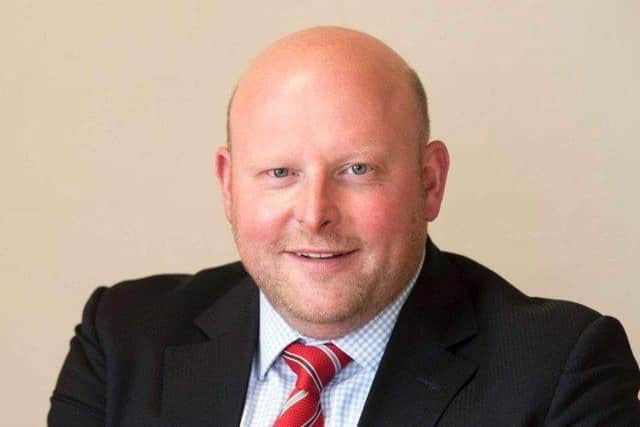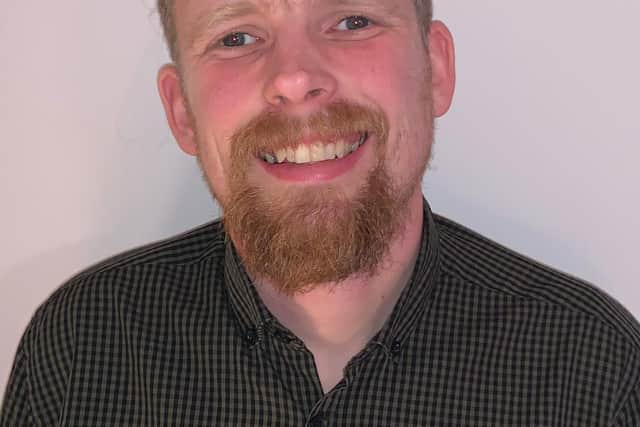Chorley local elections 2022: The big election debate - the borough's top politicians try to persuade you to back their party at the polls this week
and live on Freeview channel 276
You can watch the full debate in the video above or read the highlights below of an event in which we drilled down into subjects including housebuilding, the environment and whereabouts in the borough the council spends its cash.
Taking part were Cllr Alistair Bradley (the Labour leader of Chorley Council), Cllr Martin Boardman (Conservative opposition group leader) and Andy Hunter-Rossall (co-ordinator of the Green Party in Chorley).
Advertisement
Hide AdAdvertisement
Hide AdThe Liberal Democrats are standing only in the wards of Croston, Mawdesley and Euxton South, and Eccleston, Heskin and Charnock Richard, while the Trade Unionist and Socialist Coalition is contesting just the ward of Chorley South East and Heath Charnock. The top policy pledges from each of the parties represented on the ballot paper this year can be found here.


HOUSEBUILDING PRESSURE
Chorley Council has recently lost a series of appeals brought by developers against decisions it took to refuse - or be minded to refuse - permission for housebuilding on land which is not currently earmarked for that purpose. The authority argued that it should be obliged to build just over 100 homes per year for the foreseeable future, because of how many dwellings it has delivered as part of the Buckshaw Village development over the last 15 years. However, planning inspectors have ruled that the annual housebuilding figure in the borough should be over 500, based on the national methodology for calculating an area’s minimum housing need. The issue has become a political hot potato in the district.
ALISTAIR BRADLEY


“Government policy has changed six times on housing numbers in the last five years. So since [the last Chorley local plan] was put in place, 15 to 20 years ago, which was under a Conservative administration in Chorley…how could we foresee what the government’s policy was going to be in that period? We have been victims of the idea that if you build more, you have to build more [still]. It’s a balloon that just keeps getting bigger and bigger - and eventually it will pop. Land is finite - so what do we do next, do we build in our greenbelt, do we build in our green spaces, do we start building up on our moors and beautiful natural areas around Rivington? Because that’s the only land that will be left under current government policy.
“The backlash is coming, because people in Chorley are fed up of constant housebuilding. We can’t stop it - we put minimum numbers out there, not maximum numbers - and the government then want to add to that all the time. Sooner or later somebody has got to say enough is enough. It’s impossible to hit the government’s targets, because if we do more this year, we have to do more next year - so the whole system is flawed. So…we need to get our new local plan in place [a joint document being prepared with South Ribble and Preston] and one of the features of [that] is to have phasing [of housing delivery] in it, which would then be signed off by an inspector when [they] actually [approve] that plan. That’s what should have been done as part of [the current] plan.”
MARTIN BOARDMAN
Advertisement
Hide AdAdvertisement
Hide Ad“Planning and local plans are incredibly technical. If you read any of the appeals inspectors’ reports - and we have had several over the past couple of years - you will note there are some differences of opinion within those...reports. But the last four we have seen have come in the with the same view that Chorley’s over-delivery over the first ten years of the plan has left them in the position where they haven’t got the land to put forward to make the [necessary] future provision - even if it was just the standard 417 homes, which the local plan in 2012 signed up for - they still haven't got the land.


“One hundred and nine was the number [of homes] that Chorley Council put forward that they should be delivering for the next five years, but that has been refused several times now by the appeals inspectors. So we’re in a position where…we know the rules we have got to work in [over] the next five years and we have got to get on and see how we can make this work for us in Chorley. We can't change that, we’re going to see developers putting in applications, [so] we need to find different reasons why those applications are not sustainable within those areas. The [current] local plan clearly states…that they will deliver a minimum of 417 homes per year and the fact is that we have delivered more - way too many. If we had spread them out, we would have still had our safeguarded land. We have [also] said, several times, that we’re missing an opportunity of developing in and around our town centre.”
ANDY HUNTER-ROSSALL
“The national planning policy at the moment is absolutely ridiculous in lots of ways, in that 'growing balloon' sense of the more houses you build, the more houses you need to build, but also in the fact that it counts how many houses have been built rather than counting the housing stock - so if you demolish some houses and build some new houses, you [are considered to] have built houses, but the actual number of houses hasn't changed ,
“But also there isn't actually a crisis in housing numbers in this country - there are more bedrooms per person than there has ever been in history, but there is a lot of second-home ownership [and] we've got the wrong kinds of houses being built. We’ve got a system where the developers just cherry-pick what they want to build, which is normally four-bedroomed detached houses, because that’s what makes them the most money - but that’s not necessarily what we need. There’s loads of people on the housing waiting list [and] we definitely need more social housing, we definitely need more one bedroom and two bedroom houses, which there just aren't enough of being built. We need to build more in the town centre, where [people] are close to services. Part of the problem with what's going on at the moment, where we are getting all our..safeguarded land built on, is it’s really far away from services and people are forced to either drive or just be stuck at home. There are places being built where you have to go two miles to the nearest shop to buy a loaf of bread.”


CUTTING OUT CARBON
Advertisement
Hide AdAdvertisement
Hide AdChorley Council has a target to be carbon-neutral by the end of the decade and has just consulted on a climate change strategy But is it doing enough to reach its own goals?
ANDY HUNTER-ROSSALL
“There is a lot of good stuff in [the climate change strategy] [But] there’s two major things that I think were missing. One is that it was lacking in numbers and therefore it was focusing on the wrong things. It has ideas in there about green bus stops and green burial sites - they’re all nice to have, but actually where are our carbon emissions… coming from? Heating buildings and…transport - and there was very little in there on those two major polluters.
“The other thing I think was wrong with it was the timescale. Chorley declared a climate emergency in 2019 and…most of the actions in [the strategy] were to come up with detailed plans by 2024 or thereabouts. In 2019, it was incredibly ambitious - by 2024, it will definitely be unrealistic. We need to act now. You’ve got bus companies who’ll be buying buses now that will still be in use in ten years’ time, you've got people buying cars now that’ll still be in use in ten years’ time. You’ve got buildings being built now that will still be lived in in 20 [or] 30 years’ time. If we’re going to be carbon neutral in 2030, those things need to be carbon neutral already. The total council carbon footprint is only something like 1.5 percent of the borough’s carbon footprint, We really need to be showing leadership to the borough.”
MARTIN BOARDMAN
“Having read through the strategy…I can't understand how [the council] is going to be carbon neutral by 2030 because there isn't actually a programme or a timeline that tells us what they're going to work on and what they’re going to address. And ..the main polluter that the council owns are the buildings - and we have to address the buildings first. Only last week, Alistair brought forward a proposal to change the heating system within the town hall - [I have] absolutely wholehearted support [for] the principle of [that]. Something which the council put forward was an air source heat pump system.
Advertisement
Hide AdAdvertisement
Hide Ad"But what we don't agree with is looking at it on its own - this is one building out of a portfolio of a number of buildings. And I asked the question…why the town hall first - is it a flag-waving exercise or is it to actually save money? Alistair came back with the fact that the boilers are on their last legs, they need replacing and therefore we need to do it now. That's fine, but where does it sit within the strategy? The strategy is a lot of words, but not a great deal of programme and timetable.”
ALISTAIR BRADLEY
“I find that quite incredible from a party that abstained on a vote to reduce the town hall’s carbon emissions by 50 percent - [the Conservatives] didn't vote against it, they didn't put any other proposal forward, they just abstained on the vote. Government funding [was] being offered on a short-term basis, which we had to match - so we got £220K of government money for investment of £1.3m. Why are we doing the town hall first? Because we would have had to change the boilers anyway.
“We have a climate strategy - yes, we could go faster with a lot more help from the government aligned to a national strategy. If somebody can tell me what the national strategy on energy is, I would be amazed, because it seems to flip-flop around...on a daily basis. We do need to get a timetable in place. Housing and transport tend to be functions of national government, [so] it’s very hard for us, unilaterally, to do things. There are government programmes in place around insulation - they tend to deal with easy-to-insulate properties. There are ways [that being carbon neutral by 2030] can be done - and we are working towards those ways it can be done. Most of what Chorley’s doing is exceeding national targets… but what we need to be is supported by central government with a proper strategy to help residents affect change.”
FAIRNESS AND FINANCES
The two big issues that have long divided the only two parties represented on Chorley Council - Labour and the Conservatives - are levels of council debt and where in the borough the council spends its money. And this year’s debate was no different…
MARTIN BOARDMAN
Advertisement
Hide AdAdvertisement
Hide Ad“[People] trust the council’s elected representatives to look after the balance sheet. That balance sheet, though, isn't just today [or] this year - that balance sheet is for the next 50 years [or] 100 years for this council. Our concern is that the projects that we borrow for are beneficial to a few, but they are not beneficial to everyone. And it's all to do with accessibility and inaccessibility issues around our borough. We see the Tatton Community Centre nearing completion now - a community centre with independent living, a GP surgery and much-needed facilities for the people of Tatton - but it’s going to benefit the people of Tatton. We’ve seen the same thing again with the Clayton GP surgery - it will benefit the people in Clayton.
“Why haven't we done a borough-wide assessment of GP provision across the entire borough, as opposed to selecting one local area? We need to see where development is going to happen, where it has happened over the last ten years and what infrastructure needs to be put into place. And if we can do that, we will then see a better representation across the entire borough.
“How can we possibly level up the spending within our borough when we concentrate that spending around the town centre and within the town centre. We've got the Westway sports development complex, it's a fantastic complex - but [children like mine] can't use it. They can’t get a bus to it, they can't cycle to it and they depend on a parent to drop them at it. It is there, like the Youth Zone, to benefit the people around the town centre.“
ALISATIR BRADLEY
“It’s a myth [that Labour invests only in the town centre]. The Conservatives, at the budget [meeting], pushed us to contact the Youth Zone to see about them busing young people [in from rural areas]. We’d already been doing it…[but] to quote Martin in the [budget] debate, ‘My kids have something on every night of the week’ - and, therefore, so do other kids [and do] you can't get the critical mass to get everybody together on one night. But [the Youth Zone] are happy to do more work in those areas [and] we’re already commissioning them to do that.
Advertisement
Hide AdAdvertisement
Hide Ad“We invest in facilities that provide, usually, either health benefits, job benefits, accommodation benefits or some other kind of services - like a cinema or proper shopping, [which] a lot of town centres are losing. We invest in things that provide our communities a service, produce a financial return as well and basically benefit our communities - we believe it's sensible for a council to do that. When we go out there on the doorsteps, that’s what people want to see. They say what is the point of a politician? It’s to do something in our community.
“We did look at all the surgeries across the borough…but we know where the problem areas are, because we tend to step in when our partners, like the CCGs [clinical commissioning groups] or the doctors themselves are somehow unable to resolve that problem. That’s what a responsible local authority should do. People say Chorley town centre’s great now - why? It’s got new restaurants, new pubs, new cafes, new shops - big anchor tenants who then come and make the other people more successful.”
ANDY HUNTER-ROSSALL
It’s wrong-headed to just look at debt and say it’s all bad. Market Walk and Logistics House are bringing in income at a time when national government have been slashing funding, as they have been for ten years, for local councils. We need those alternative sources of funding and that needs some upfront investment to get that long-term funding in.
“I’m a really big fan of the Preston Model. [Alistair is] comparing Chorley to that - but I think we could go a lot further in that direction. Preston have insourced a lot of services and ..they also work with other large public sector contractors - they work with the local NHS and ensure there’s procurement policies about supporting locally-owned businesses and creating a strong local economy, which again brings in tax revenue. And that’s the kind of thing that you need when you’re getting your funding slashed from central government.
